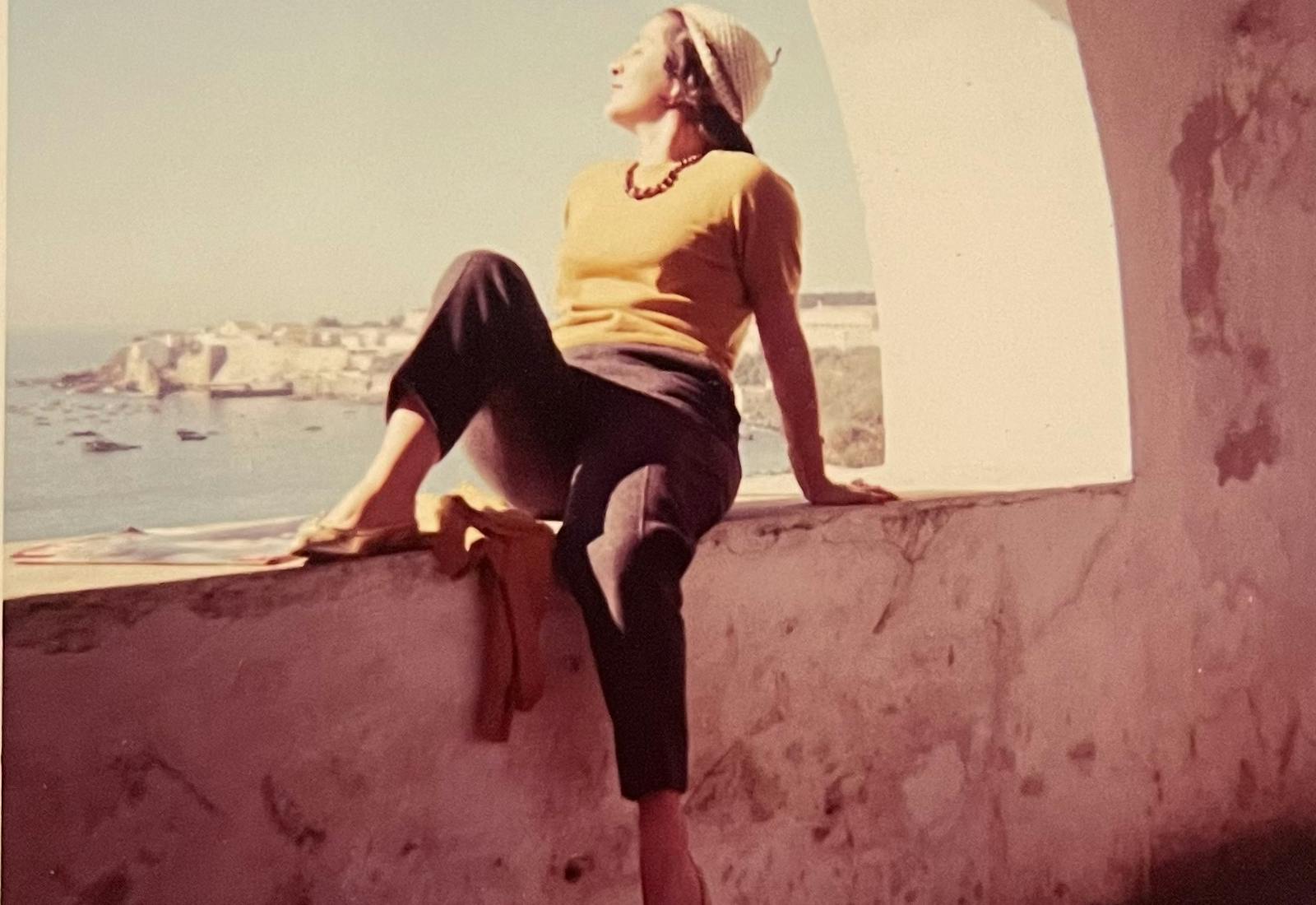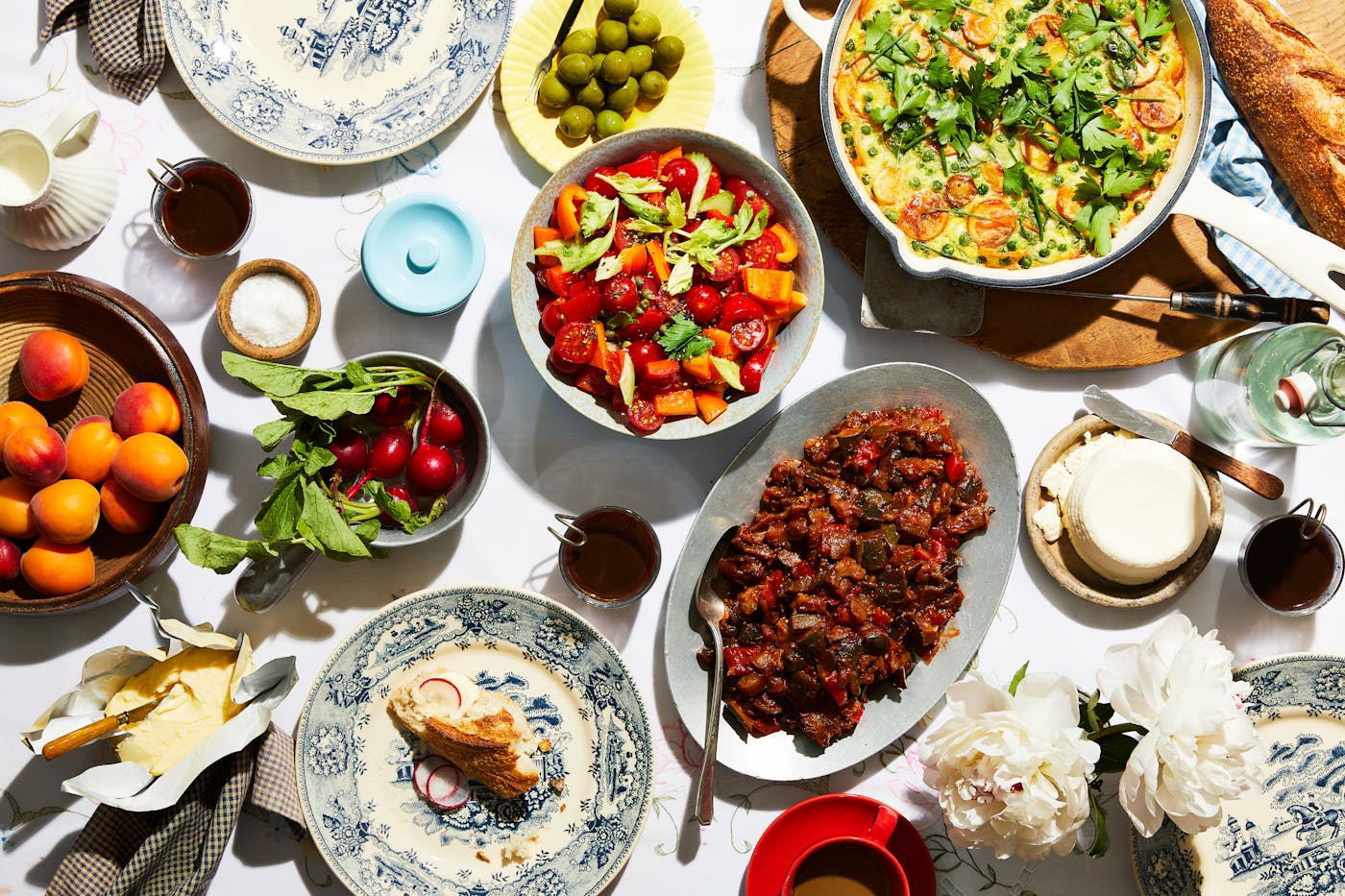Shared by Elle Brosh

Elle Brosh is an LA-based chef and educator who runs Dadah, a culinary anthropology project dedicated to preserving North African-Jewish history and culture through food. In this piece, she tells us her family’s story in her own words.
My 93-year-old grandmother Adéle is beautiful, clever, and garishly French. She has a thick, high-pitched accent and wouldn’t be caught dead without a colorful silk scarf around her neck or a burst of fake flowers in her hair. Born in Saint Fons, France, an industrial town on the banks of the Rhône River, she worked as a midwife in England, a secretary in Lisbon, and a choir singer in Jerusalem before finally settling down in suburban New Jersey in 1968.
When I was growing up, we’d often go to my grandparents house for Sunday brunch. Amidst the Provence travel posters and heaps of multicolored clutter, we’d gather around their plastic-covered dining table and enjoy dishes that felt incongruous with my grandma’s Francophile exterior. In place of croissants and crêpes, there were flatbreads, paired with soft cheese, chopped vegetable salads, and a potato omelette that was thick and round, not buttery and folded. On special occasions, there was vegetable couscous and beef kefta, or a thick stewed version of ratatouille. For dessert, my grandma would use a paring knife to dole out slices of perfectly ripe apricots.
Brunch was one of the rare occasions where I witnessed my grandma’s North African-Jewish ethnicity overshadow her French nationality. However, these meals were served without commentary or colorful tales about her father’s Morocco or her mother’s Algeria. As I got older, I began to question why we knew so little about our North African heritage. I felt like something was missing — both from the story and myself.
After some pressing, my grandma explained that her parents were tight-lipped about their ancestral homelands. She told me she inherited her “discreet and refined” behavior from her father, Azar, a small, stern man perennially dressed in a suit and tie. Born in 1896 in Mogador, Morocco, Azar came of age during France’s brutal colonization of North Africa and, when he was 20-years-old, was recruited by the French army. After WWI, he managed to escape his repatriation by going to work in Saint Fons as part of a small group of Moroccan-Jewish colonial laborers.
Eager to settle in France permanently and gain citizenship, some of the men like my great-grandfather went to find brides in Algeria, where Jews had been awarded French citizenship. After marrying my great-grandmother Zahra Ben Hamou in 1928, the newlyweds immediately took a boat from Oran to France and never returned. Within a year, they had their first of nine French-born, French-named children — my grandmother Adéle was the third.
In the North African-Jewish enclave of Saint Fons, European assimilation was imperative. Children were educated in French-Jewish schools where they were encouraged to adopt Western ways of learning, speaking, and dressing. But, sometimes, in the privacy of their dilapidated, tenement home, my grandma’s family cooked North African-Jewish foods — golden omelettes, crunchy salads, and fluffy couscous. Despite her parents' efforts to distance themselves from the past, out of necessity, the foods of their youth endured. Sadly, my great-grandma Zahra’s few recipes were never transcribed because she couldn’t read or write, and due to the Holocaust and other circumstances, her ability to teach her children was limited.
Although these recipes bore the scars of cultural suppression, poverty, and war, my grandma managed to safeguard the ones she treasured from her youth. It became clear that cooking was her desperate attempt to connect with a culture she was never encouraged to know. Although her repertoire of dishes was limited and her understanding of their history incomplete, she cooked them so we could feel connected too, and perhaps, one day, try and solve the mysteries she couldn’t.
A few years ago, the unanswered questions about my North African-Jewish heritage began to haunt me. Generations of loss were suddenly boiling up within me. I needed to pick up where my grandma left off and cook my way back. I started with our family’s brunch dishes. I cross referenced them with cookbooks new and old, as well as historical archives and texts. After years of research and a trip to Morocco in 2022, I am just scratching the surface of my relatives' beautiful, yet complex history. With every seed, spice, and grain, I learn something new about my ancestors, and the ways in which they shaped the rich, transcultural societies they lived in, and myself.
Sometimes I am led to dead ends, but other times I am transported to a time and a place I wish my grandma could feel proud of. One day it will be my turn to host family brunch. I hope to keep her dishes alive, and reinvigorate them with the pieces that were thrown away, forgotten, and finally recovered.
